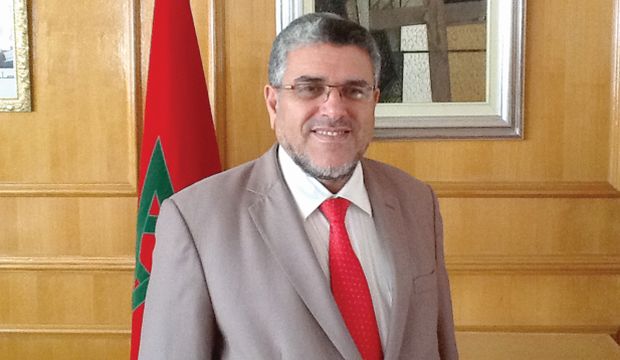
Moroccan Justice Minister Mustapha Ramid talks to Asharq Al-Awsat in Rabat, Morocco. (Asharq Al-Awsat)
Rabat, Asharq Al-Awsat—Moroccan Justice Minister Mustapha Ramid warned this week that the state must confront extremist ideology and jihadism in all its forms in order to prevent the Islamic State of Iraq and Syria (ISIS) from gaining a foothold in the North African country.
In comments to Asharq Al-Awsat, the Moroccan Justice Minister confirmed that the government is seeking to strengthen its anti-terror legislation in order to protect the country from the threat of extremism.
“Regarding national security, there is no difference between the Moroccan government and other governments [on the issue of anti-terrorism]. Travelling to areas of tension has become a crime across the world, as this represents a dangerous step in encouraging terrorism in one way or another. As for Morocco, the judicial view is that traveling abroad to fight is a crime of terrorism on the basis that somebody going to fight abroad represents a threat to the state when they return,” Ramid said.
He also warned against the rising threat of terrorism, particularly citing the dangerous ideology of Salafist jihadism. “Salafist jihadism cannot be dealt with by security monitoring alone. Yes, this is a necessity, but this requires additional approaches including reconciliation and integration. We hope that this issue is now being dealt with in the correct manner,” the Moroccan Justice Minister said.
Ramid acknowledged that a number of Moroccan nationals, released from prison after serving sentences for terrorist offenses, have sought to travel abroad and join the fighting in Iraq and Syria.
“However it is not true to say that the majority of Moroccans who have been released from prison have traveled to Syria. Yes, a number have traveled to Syria but they are not a majority,” he said.
“The most important reason for this is that there has been, until now, no policy of integration to take care of these released prisoners until they can psychologically, socially and economically reintegrate safely into Moroccan society,” he added.
Ramid, who is a member of the ruling Justice and Development Party, cited “economic” and “psychological” factors as enticing Moroccan nationals to travel abroad, pledging that security apparatus will do everything in its power to clamp down on those seeking to recruit and radicalize Moroccan youth.
Morocco’s amended anti-terror law now stipulates a prison sentence of between 5 and 15 years for anyone found guilty of inciting terrorism. “The aim of this is to protect the youth from becoming victims of sweeping propaganda,” the minister said.
